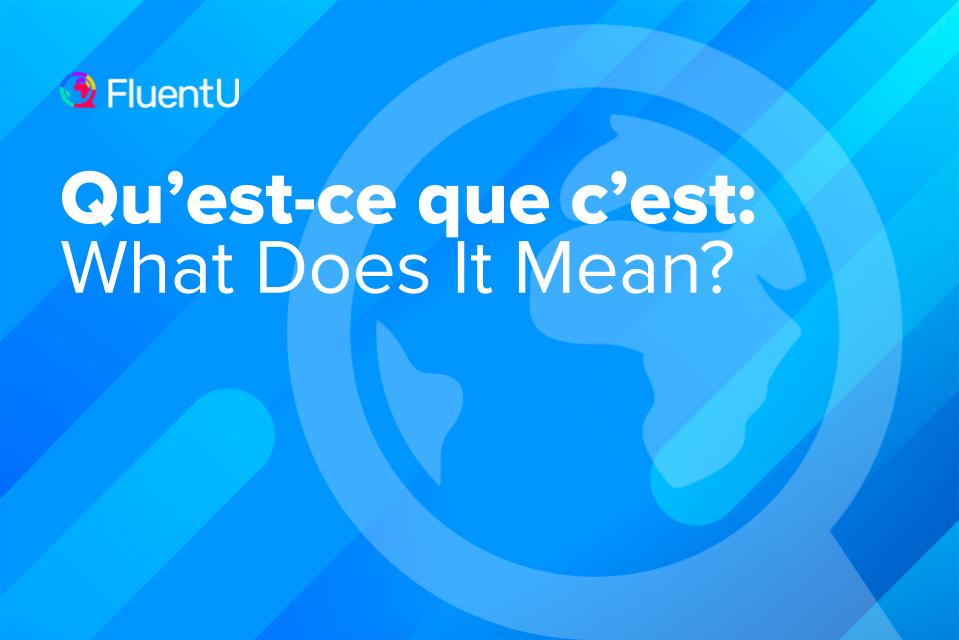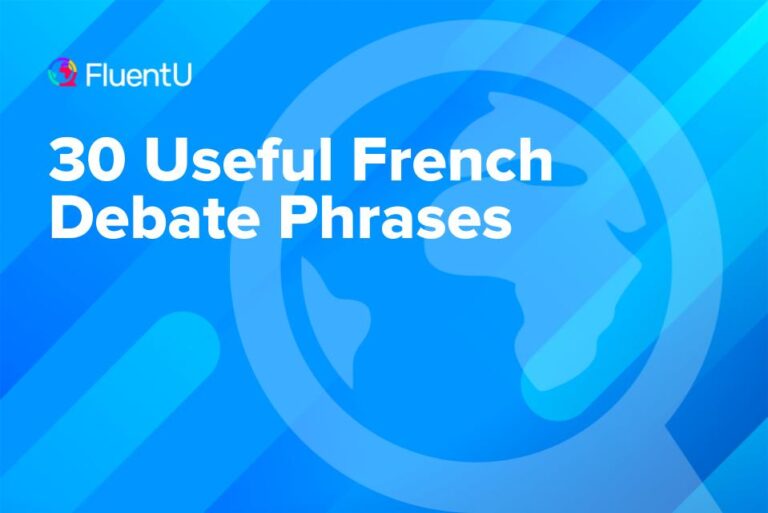Qu’est-ce que c’est: What Does It Mean?

French expressions like qu’est-ce que c’est are integral to understanding the language’s unique structure and cultural nuances. Whether you’re a beginner learning French or refining your skills, mastering this expression will enhance your conversational abilities and comprehension.
Below I will demystify the phrase for you by explaining its components, literal meaning and the emotions it can convey in different contexts.
Download: This blog post is available as a convenient and portable PDF that you can take anywhere. Click here to get a copy. (Download)
What Does qu’est-ce que c’est Mean?
To a non-native speaker, qu’est-ce que c’est can be a source of frustration.
We can translate it as, “What is it”—and that captures the basic meaning.
But what’s with all the extra words?
Anatomy of an idiomatic expression
Let’s break this down a bit.
First of all, the initial qu’ of qu’est-ce: It’s short for que , meaning “that.”
Que ends in a silent e. When it’s placed next to est-ce , it loses its silent e in a process called elision. (Don’t feel bad, though. Que may lose its e, but it gets a snazzy new apostrophe to put in its place.)
So, est-ce. Just what is this vowel-stealing component of qu’est-ce que c’est?
Est simply means “is.” It’s just the present-tense, third person conjugation of être (to be).
And the little tag-on, -ce? It merely means “this.” Or “that.” It’s barely noticeable. It’s barely even uttered. (Just add a very slight hissing sound after you say est, before you pronounce que.) Technically, ce is a demonstrative adjective. It usually goes in front of a noun, to indicate “this (one)” or “that (one).”
Put together, est-ce literally means “is this”—or “is that.”
So far, we have qu’est-ce —“what is this.”
Next up, another que (that). This que doesn’t lose its –e like the last one did. It’s used as a conjunction to introduce the next part of the phrase— c’est (it is).
And here’s where things get really weird, because we now have the full phrase: qu’est-ce que c’est. A phrase that can be literally translated as, “What is this that it is?”
Qu’est-ce que c’est versus est-ce que
All this talk of qu’est-ce que c’est may bring to mind the heart of this expression: est-ce que .
Est-ce que (is it that) gets a lot of mileage in French.
You may have been taught est-ce que as a way to ask questions:
- Est-ce que Paul est ici ? (Is Paul here?)
- Est-ce qu’il connaît Sandrine ? (Does he know Sandrine?)
- Est-ce que l’avion vient d’arriver ? (Did the plane just arrive?)
- Est-ce qu’on va arrêter de poser toutes ces questions ? (Will we stop asking all these questions?)
Qu’est-ce que c’est, like est-ce que, is an interrogative. Even though they share a core of words, they’re not interchangeable.
Est-ce que basically means “is,” or “does,” or “will,” depending on the context.
Qu’est-ce que c’est, on the other hand, asks “what.”
Shades of meaning
In more casual French, you’ll often hear, c’est quoi, ça ? —literally meaning, “it’s what, this/that?” (We’d say, “What’s this?” or “What’s that?” in English.)
Qu’est-ce que c’est is a bit more formal than c’est quoi, ça. However, it’s not always more polite.
Depending on the context and tone of voice used, qu’est-ce que c’est can be used to express a wide variety of emotions and shades of meaning.
We’ll look into fine-tuning our use of qu’est-ce que c’est in a moment.
Using qu’est-ce que c’est in Context
Depending on the context, qu’est-ce que c’est can communicate a whole spectrum of emotions.
Expressing curiosity
First and foremost, qu’est-ce que c’est is used for identifying unknowns.
Say it in a wonder-filled voice as you use it to discover as-yet-unknown names of objects around you—much as a young child might:
Qu’est-ce que c’est, ce truc-là ? (What is that thing over there?)
Placing emphasis
You can use qu’est-ce que c’est to emphasize your question or to add intensity to the conversation.
Add another que to the end of the expression, or drop the c’est from the end of qu’est-ce que c’est to ask about the fundamental nature of something:
- Qu’est-ce que c’est que la vérité ? (What is truth?)
- Qu’est-ce que c’est qu’une grasse matinée ? (What is a “fat morning?”)
- Qu’est-ce que l’univers ? (What is the universe?)
- Qu’est-ce qu’une expression idiomatique ? (What is an idiomatic expression?)
Revealing incredulity
If you simply can’t believe what’s going on around you, distill your disbelief into a question:
Qu’est-ce que c’est que ça ? (What [the heck] is that? / What on earth is going on?)
Your listeners will know that you’re stunned by whatever you’re witnessing.
Showing anger
Go from incredulous to furious with the same expression:
Said in a tone of righteous indignation, qu’est-ce que c’est que ça ?! asks, “What is the meaning of this?!”
If you’re offended by a question, you can demand to know:
Qu’est-ce que c’est, cette question ?
… In other words, “What kind of question is this?! What are you asking me?!”—with a dollop of “How dare you!” thrown in for good measure.
Related French Expressions
You’ll recognize the basic structure of qu’est-ce que c’est in some related expressions.
Qu’est-ce que tu fais ? (What [in the world] are you doing?)
In this expression, you’re dropping the final c’est from qu’est-ce que c’est in favor of a subject and a verb.
You can use the formal version— qu’est-ce que vous faites (what are you [formal/plural] doing)—or stick with the informal tu (you).
As always, your tone of voice will go a long way in determining whether this question is interpreted as curiosity or a show of irritation.
Qu’est-ce qui se passe ? (What’s going on? / What’s happening?)
Here, the que c’est is replaced by qui (who). However, it doesn’t mean “what is that who passes by.” When used in the reflexive, se passer means “to take place.”
Again, this can mean “what’s happening?” or “what the devil is going on?”, depending on context and tone of voice.
Qu’est-ce qui est arrivé ? (What happened?)
This is similar to qu’est-ce qui se passe, only it uses the passé composé (compound past tense) to ask about what has already occurred.
Ni quoi, ni qu’est-ce (Nothing at all)
In English, we’d probably say, “Not this, that or the other” to express the spirit of ni quoi, ni qu’est-ce que.
Its synonyms in French include aucune chose (not a single thing) and rien du tout (nothing at all).
Simply put, it means “nothing.”
It dates back at least to the time of Marcel Proust, but you can still find it in various modern contexts—such as blog posts and adult contemporary songs.
Practicing qu’est-ce que c’est
As with any French expression that you’re incorporating into your repertoire, you’ll need to practice qu’est-ce que c’est in several different modalities to really get the hang of it.
Hear it spoken
Qu’est-ce que c’est probably gets the most play in conversation. Before you start using it, give yourself the chance to hear it spoken in a variety of ways.
On YouTube, you’ll be able to find a few musical and conversational entries.
Sing and Learn’s Qu’est-ce que c’est song for kids in French brings you toe-tapping practice with a catchy little melody.
In the mood for a sea shanty? Señor-Monsieur Johnson MFL’s version of this “Drunken Sailor” tune will have you hoisting a glass and saying “Cheers”—in French, of course!
For a more sober exploration of this expression, the C’est Jackie channel leads you through listening and speaking exercises. Jackie demonstrates a wide range of emotions that can be expressed with this versatile phrase.
Another great way to practice this phrase is to hear it used in native French media, such as in songs, movies, on the radio, or even on a language learning program like FluentU.
FluentU takes authentic videos—like music videos, movie trailers, news and inspiring talks—and turns them into personalized language learning lessons.
You can try FluentU for free for 2 weeks. Check out the website or download the iOS app or Android app.
P.S. Click here to take advantage of our current sale! (Expires at the end of this month.)
Use it in French conversation
As French learners, we’re always trying to find more ways to fit conversation practice into our everyday lives.
Why not include qu’est-ce que c’est in your French conversations?
It’s quite a helpful expression, after all. You can use it to elicit information about the world around you.
Point and use qu’est-ce que c’est to learn names for common household objects.
Keep your hands to yourself and use qu’est-ce que c’est to question your conversation partner while arguing about the deeper meaning of life.
Read it
You can find qu’est-ce que c’est in books, magazines and newspapers.
The phrase is used in the title of books on myriad topics.
You might spy the phrase in children’s books, which often involve learning about the world. Try books like “What is this? Qu’est-ce que c’est ?” to see this phrase in action.
Hunt down qu’est-ce que c’est in contemporary novels, where it might be featured in dialogue.
Look for it in the lines of editorials and op-ed pieces in French newspapers.
Write it out
Brush up on your French writing skills and learn to use qu’est-ce que c’est, all at the same time.
When you write the expression, be sure to include all the right punctuation in the right places:
- An apostrophe after the first qu’
- A hyphen between est and –ce
- An apostrophe between c’ and est
Use qu’est-ce que c’est in your French language journal. Insert it into emails. Just use it!
Whether you’re trying to learn French vocabulary to describe the world around you, pondering the discourse of talking heads or expressing your exasperation, you now have a killer query that can be used in almost any context.
And one more thing...
If you like learning French vocabulary on your own time and from the comfort of your smart device, then I'd be remiss to not tell you about FluentU.
Other sites use scripted content. FluentU uses a natural approach that helps you ease into the French language and culture over time. You’ll learn French as it’s actually spoken by real people.
FluentU has a wide variety of great content, like interviews and web series, as you can see here:

FluentU brings native videos within reach with interactive subtitles.
You can tap on any word to look it up instantly. Every definition has examples that have been written to help you understand how the word is used.

For example, if you tap on the word "crois," you'll see this:

Practice and reinforce all the vocabulary you've learned in a given video with FluentU's adaptive quizzes. Swipe left or right to see more examples for the word you’re learning and play the mini-games found in the dynamic flashcards, like "fill in the blank."

As you study, FluentU tracks the vocabulary that you’re learning and uses this information to give you a 100% personalized experience.
It gives you extra practice with difficult words—and reminds you when it’s time to review what you’ve learned.
Start using the FluentU website on your computer or tablet or, better yet, download the FluentU app from the iTunes or Google Play store. Click here to take advantage of our current sale! (Expires at the end of this month.)








